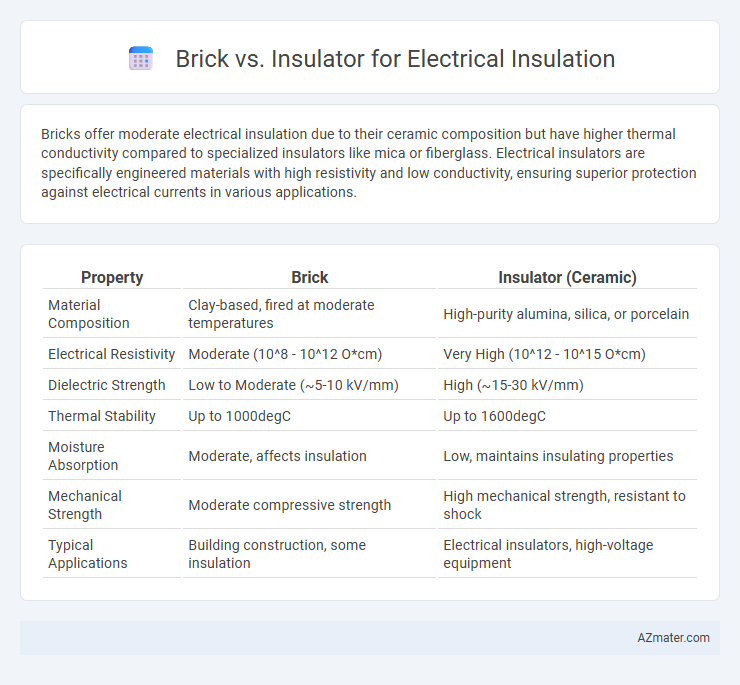Bricks offer moderate electrical insulation due to their ceramic composition but have higher thermal conductivity compared to specialized insulators like mica or fiberglass. Electrical insulators are specifically engineered materials with high resistivity and low conductivity, ensuring superior protection against electrical currents in various applications.
Table of Comparison
| Property | Brick | Insulator (Ceramic) |
|---|---|---|
| Material Composition | Clay-based, fired at moderate temperatures | High-purity alumina, silica, or porcelain |
| Electrical Resistivity | Moderate (10^8 - 10^12 O*cm) | Very High (10^12 - 10^15 O*cm) |
| Dielectric Strength | Low to Moderate (~5-10 kV/mm) | High (~15-30 kV/mm) |
| Thermal Stability | Up to 1000degC | Up to 1600degC |
| Moisture Absorption | Moderate, affects insulation | Low, maintains insulating properties |
| Mechanical Strength | Moderate compressive strength | High mechanical strength, resistant to shock |
| Typical Applications | Building construction, some insulation | Electrical insulators, high-voltage equipment |
Introduction to Electrical Insulation
Electrical insulation is crucial for preventing unintended current flow and ensuring safety in electrical systems. Bricks, with their porous structure and moderate resistivity, offer limited insulation properties, suitable mainly for structural support rather than high-voltage applications. Insulators, made from materials such as ceramics, glass, or polymers, possess high dielectric strength and minimal conductivity, making them ideal for effectively isolating electrical components and maintaining system integrity.
Understanding Brick as an Electrical Insulator
Brick functions as a moderate electrical insulator due to its composition of clay and other minerals that provide resistance to electrical current flow. Its porosity and moisture content can affect insulating properties, making dry brick more effective at preventing electrical conduction. While not as efficient as specialized insulators like ceramics or polymers, bricks offer an economical and durable option for non-critical electrical insulation applications.
Characteristics of Traditional Insulation Materials
Traditional insulation materials like bricks provide moderate thermal resistance and structural support while offering basic electrical insulation properties. Insulators such as ceramic and glass demonstrate high dielectric strength and low electrical conductivity, making them ideal for preventing current flow. The porous nature of bricks results in higher moisture absorption, reducing their effectiveness compared to specialized insulators designed for electrical applications.
Electrical Conductivity: Brick vs Insulator
Bricks typically exhibit moderate electrical conductivity due to their clay and mineral content, which allows limited current flow, making them semi-conductive materials in certain conditions. Insulators, such as rubber, glass, and specialized polymers, possess extremely low electrical conductivity, effectively preventing current flow and providing superior electrical insulation. The fundamental difference lies in the material composition; bricks conduct electricity poorly compared to insulators, which are designed to maintain high resistance and block electrical charge transfer.
Thermal Properties and Their Impact on Insulation
Bricks have moderate thermal conductivity which allows them to absorb and slowly release heat, making them suitable for applications requiring thermal mass but less effective as insulators compared to specialized insulating materials. Insulators like ceramic or polymer-based insulators exhibit low thermal conductivity, minimizing heat transfer and providing superior thermal insulation essential for preventing energy loss and protecting electrical components. The choice between brick and dedicated insulator materials directly impacts the efficiency of electrical insulation systems by balancing thermal management and electrical safety requirements.
Moisture Resistance: Which Performs Better?
Bricks absorb moisture due to their porous structure, which can compromise their effectiveness as electrical insulators by allowing current leakage and reducing dielectric strength. Insulators specifically designed for electrical applications use materials like ceramics, glass, or polymers with inherently low moisture absorption, maintaining high dielectric resistance even in humid environments. Therefore, insulators outperform bricks in moisture resistance, ensuring more reliable and safer electrical insulation under wet conditions.
Durability and Longevity Comparison
Bricks exhibit high mechanical strength and thermal stability, making them durable for electrical insulation in harsh environments, but their porous nature can lead to moisture absorption, potentially reducing longevity. Insulators made from materials like porcelain or polymer composites offer superior resistance to electrical breakdown and environmental degradation, ensuring longer service life in electrical applications. The choice between brick and specialized insulators depends on the specific requirements for durability, moisture resistance, and consistent insulating performance over time.
Cost Analysis: Brick vs Insulator
Bricks provide a cost-effective solution for electrical insulation primarily due to their widespread availability and lower material cost compared to specialized insulators. Insulators, while more expensive upfront, offer superior thermal and electrical resistance, potentially reducing maintenance and failure costs over time. Evaluating the total lifecycle cost often favors insulators for high-demand applications, despite bricks' initial affordability in low-voltage or less critical environments.
Safety Considerations in Electrical Insulation
Bricks offer limited electrical insulation properties, primarily serving as mechanical barriers, whereas insulators like ceramics and polymers provide high dielectric strength essential for preventing electrical leakage and ensuring safety. Proper selection of materials with high resistivity and thermal stability minimizes risks of electrical shock, short circuits, and fire hazards in electrical systems. Safety standards recommend using certified electrical insulators that comply with industry regulations to enhance protective performance and reliability.
Conclusion: Choosing the Right Material for Electrical Insulation
Bricks offer limited electrical insulation due to their porosity and moisture absorption, which can reduce dielectric strength, while specialized insulator materials like ceramics, polymers, and composites provide superior dielectric properties and reliability in electrical applications. Selecting the right insulation material depends on factors such as voltage levels, thermal resistance, mechanical strength, and environmental conditions, with insulators designed specifically for electrical use ensuring better safety and performance. For critical electrical insulation needs, materials engineered for high dielectric strength and durability are preferred over conventional bricks to prevent electrical failures and hazards.

Infographic: Brick vs Insulator for Electrical Insulation
 azmater.com
azmater.com